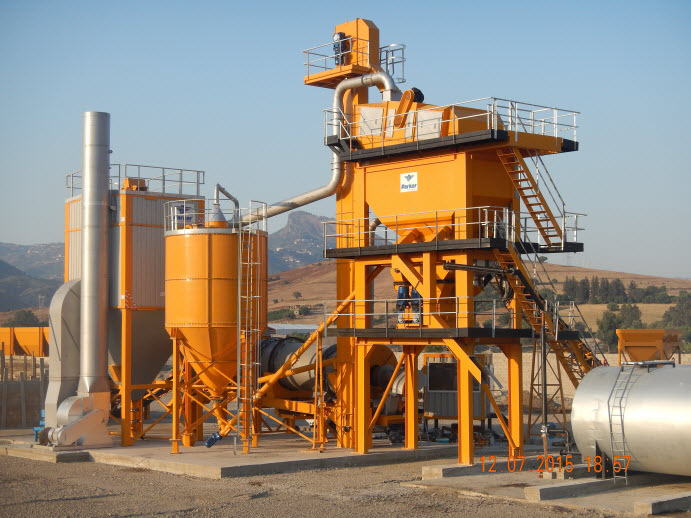An asphalt batching plant is a vital piece of equipment in the construction industry, particularly for roadways and infrastructure projects. Selecting the right asphalt batching plant ensures efficient production, consistent quality, and cost-effectiveness. With various options available, including mobile, static, and modular plants, understanding key features is crucial for making an informed decision.
This article highlights the essential features to consider when choosing an asphalt batching plant and provides guidance for identifying the most suitable equipment for your project.
Understanding Asphalt Batching Plants
Asphalt batching plants mix aggregates, bitumen, and other additives to produce asphalt. These plants can be categorized into:
- Mobile Asphalt Batching Plants: Portable and ideal for projects requiring frequent relocation.
- Static Asphalt Batching Plants: Designed for high-capacity production at fixed locations.
- Modular Asphalt Batching Plants: Offer flexibility with components that can be easily configured or expanded.
Key Features to Consider Asphalt Batching Plant
Capacity Measure
Capacity is a fundamental factor when selecting an asphalt batching plant. It determines the volume of asphalt the plant can produce per hour, typically ranging from 20 to 400 tons.
- Small-Scale Projects: Choose a plant with lower capacity for local roads or smaller urban developments.
- Large-Scale Projects: Opt for high-capacity plants for highways, airports, or industrial zones.
Supports Mobility
For projects spread across multiple locations, mobility is crucial.
- Mobile Asphalt Batching Plants: These are easy to transport and set up, making them ideal for short-term or remote projects.
- Static Asphalt Batching Plants: Better suited for long-term, large-scale operations at fixed sites.
Automation and Control Systems
Modern asphalt batching plants come equipped with advanced control systems that enhance efficiency and precision. Look for features like:
- Automated weighing and mixing processes.
- Real-time monitoring of temperature, material flow, and moisture levels.
- User-friendly interfaces and remote operation capabilities.
Mixing Quality choosing Asphalt Batching Plants
The quality of the mixer is critical for producing consistent asphalt. A high-quality pugmill or drum mixer ensures:
- Uniform blending of aggregates, bitumen, and additives.
- Minimal material wastage.
- Flexibility to produce various asphalt mixes.
Asphalt Batching Plant provides Fuel Efficiency
Fuel consumption significantly affects operational costs. Choose a plant with:
- Energy-efficient burners for the drying and heating process.
- Advanced insulation to reduce heat loss and fuel usage.
Environmental Compliance in Asphalt Batching Plant
Environmental regulations are becoming increasingly stringent. Select a plant that incorporates:
- Dust collection systems to minimize particulate emissions.
- Low-emission burners to reduce greenhouse gas output.
- Proper waste management systems to handle byproducts.

Asphalt Batching Plant Modularity and Customization
For businesses with diverse needs, modular asphalt batching plants offer:
- Easy scalability to accommodate future growth.
- Flexibility to add or remove components based on project requirements.
Supplier and Manufacturer Reliability in Asphalt Batching Plant
Partnering with reputable Mobile Asphalt Batching Plant Manufacturers and Static Asphalt Batching Plant Suppliers ensures:
- High-quality equipment with long lifespan.
- Comprehensive maintenance and support services.
- Availability of spare parts and technical assistance.
Asphalt Batching Plant Process
Understanding the operational process helps in selecting the right plant. The key steps include:
- Aggregate Feeding: Aggregates are stored in separate bins and transported to the drying drum via conveyor belts.
- Drying and Heating: Aggregates are dried and heated to the required temperature.
- Weighing and Mixing: The heated aggregates, bitumen, and additives are precisely weighed and mixed.
- Storage and Loading: The finished asphalt mix is stored in silos and loaded onto trucks for transportation.
Applications of Asphalt Batching Plants
Asphalt batching plants are used in:
- Road construction and maintenance.
- Airport runways and parking lots.
- Industrial and commercial infrastructure projects.
Benefits of Choosing the Right Asphalt Batching Plant
- Cost Efficiency: Properly selected equipment minimizes operational costs and material waste.
- Consistent Quality: Ensures high-quality asphalt with uniform composition.
- Flexibility: Mobile and modular plants allow easy adaptation to different projects.
- Environmental Responsibility: Compliance with regulations reduces the environmental impact of operations.
Conclusion
Choosing the right asphalt batching plant requires careful consideration of capacity, mobility, automation, environmental compliance, and supplier reliability. By focusing on these key features, businesses can ensure efficient operations, cost savings, and high-quality asphalt production. Whether opting for a mobile, static, or modular plant, aligning the equipment with project needs is the key to success in the construction industry.
FAQs About Asphalt Batching Plant
Mobile plants are portable and suitable for projects requiring frequent relocation, while static plants are designed for fixed, high-capacity operations.
Consider your project size and frequency. Smaller projects may require 20–50 tons per hour, whereas large-scale infrastructure projects may need 200–400 tons per hour.
Modular plants offer flexibility, scalability, and customization, making them ideal for businesses with diverse project requirements.
Choose a plant with dust collection systems, low-emission burners, and waste management solutions to meet environmental regulations.
High mixing quality ensures uniform asphalt composition, reducing material waste and improving the durability of constructed surfaces.





